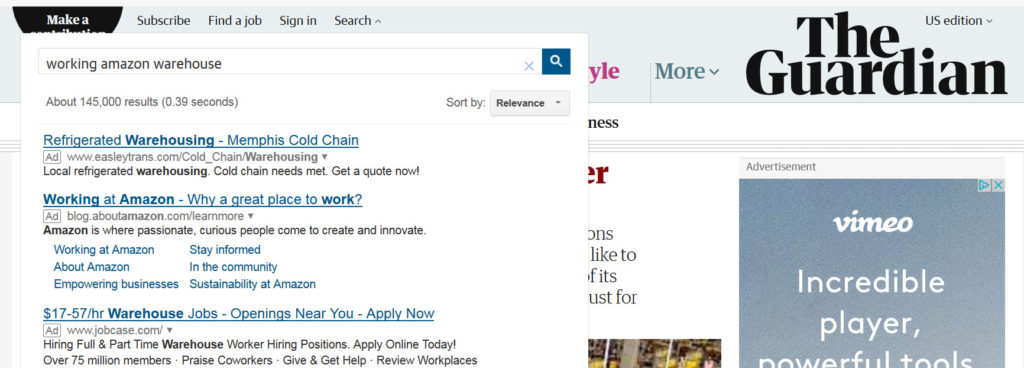Brian has his eye on a book. He says I might want to read it too. I don’t remember what it is.
His irritation with the suggestion that he doesn’t buy this book from Amazon was visible. Who can blame him? With me it’s always something.
In the Star Tribune there was an article about how Amazon has a patent for a device that tracks its warehouse employees. Where are they? Where are their hands? What? He can’t find the dildo bin? Give that dumbass a zap. Nudge him three feet to the left. Literally. Efficiently. Ship it stat!
This device can track bathroom breaks. The article didn’t say whether it also scheduled doctor’s appointments based on how loose or solid a poop was or how long it took to evacuate or whether there was blood or the wrong kind of bacteria in it. But wouldn’t that be a good idea? I might get on board if we could tie apocalyptic surveillance to a better healthcare system.
Instead, I’m bugging Brian. Poor guy.
Warehouse employees, huh? What about corporate? Don’t be stupid. Executives do not need to be monitored like a Level III sex offender. They’re naturally productive. Everybody knows this. Suits do not waste time. And no one is going to cheat the system from a private office.
I read:
“Max Crawford, a former Amazon warehouse worker in Britain, said in a phone interview, ‘After a year working on the floor, I felt like I had become a version of the robots I was working with.’” (Yeginsu)
“Repulsive”, I think. I put the paper down and then warm up my coffee for the tenth time.
But we’re sort of trapped aren’t we? I looked all over this town and couldn’t find litmus paper anywhere. Nobody had it and most retail employees didn’t even know what it was (if only I could have administered a shock – low-level of course – that would have prompted 8th grade science memories). I was desperate and resorted to Amazon. Yes. A person can be desperate for litmus paper. It was a paint job. There were chemicals. That’s all you need to know. In any case, I do hope that nobody was zapped in the nuts over filling my stupid order.
Tracking devices aside, in 2013 Carole Cadwalladr of The Guardian documented the utterly depressing life in an Amazon warehouse. What more is there to know? And yet complete disengagement seems impossible. Why?
People have done harder things on principle.
In their 70s, my parents became vegetarians. While driving to San Antonio they saw a feedlot. That was it. “We’re vegetarians now,” my dad said. “I don’t want to be a part of that.”
Brian will tell you that boycotts don’t work. I’m not sure. Either way Amazon isn’t going anywhere anytime soon and neither is beef. And yet organic and humanely raised meat is a growing market. In part I credit a “quiet turning away” not unlike what my parents did in the face of something they could not stomach. I’d be stunned if they ever chained themselves to anything or otherwise got themselves arrested just to make a point. They’re not professionals. And that’s the beauty of it. Because these fairly conservative Midwesterners are not alone. So while this turning away might have been understated, it is potentially massive, reaching far beyond the usual suspects.
Industry notices. Industry responds. Whether this response is born out of real listening and concern or a strategic quelling of a rumbling from beneath is another issue. But it is some measurement of the impact of our choices. Any time we see a corporation appeal to our better nature – whether it be a concern for the environment (“Clean Coal!”), our health (“No saturated fats in these fries!”), the critters (“Free range, baby!”) or each other (“Buy this petroleum jelly and we’ll help some poor people!”) – we are indeed seeing a reflection of our own power. We did that. Not them.
If only all moral lines could be as viscerally shocking as an animal in distress.
In a Sun Magazine newsletter that was touting Sy Safransky book, it warned Many Alarm Clocks won’t be easy to find in most bookstores, nor will it be available from Amazon, because we all have to draw a line somewhere.“ This was three years ago and it stuck with me; standing for something matters. Still, while it gave me pause to consider the oddity of a writer who dared to eschew a bookselling giant, I did not feel compelled to put my foot down where Amazon was concerned. It’s kind of like putting off a colonoscopy. I’m afraid to look too closely. It’s going to be unpleasant. What if it’s bad news? I don’t want to hear something that requires further action.
So where do I draw the line?
Where do you draw the line?
When do we quietly (or not so quietly) turn away from that which isn’t good for people and toward something that is?
Are we really so trapped?
Even if we can’t orchestrate an effective boycott, let’s keep these questions in front of us. Of course we secretly hope never to have cause to take a stand. That’s just a pain in the butt and by contrast Amazon is so damn convenient.
I suspect if ever the downfall of our society is examined, “convenience” is going to be found at the heart of it.

Yeginsu, Ceylan. “If Workers Slack Off, the Wristband Will Know. (And Amazon Has a Patent for It.)” New York Times, 1 February 2018, www.nytimes.com/2018/02/01/technology/amazon-wristband-tracking-privacy.html.
My week as an Amazon insider
https://www.theguardian.com/technology/2013/dec/01/week-amazon-insider-feature-treatment-employees-work
The Yes Men
http://theyesmen.org/index.php/portfolio_page/beyond-the-golden-parachute/